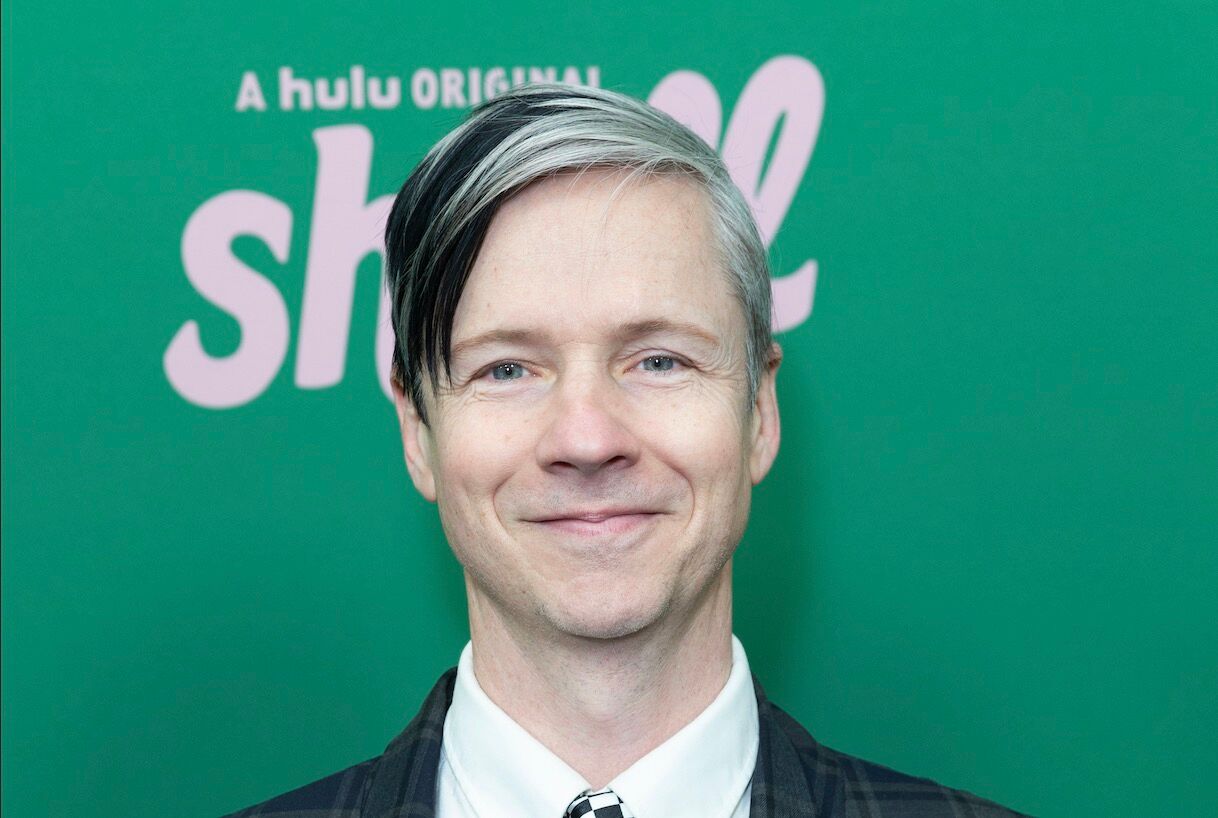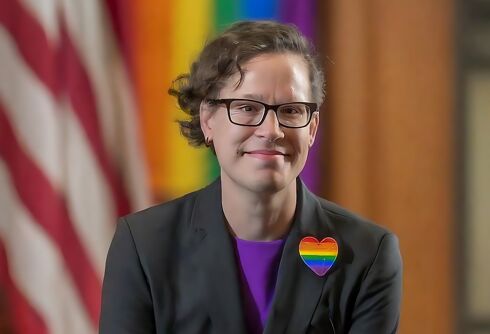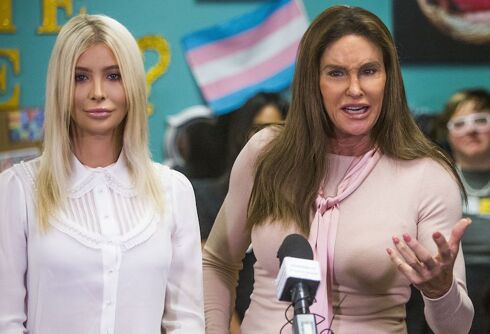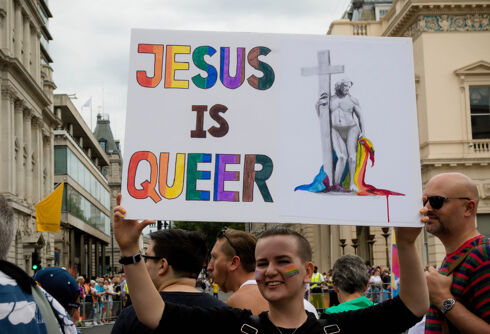In early 2021, playwright Gage Tarlton came upon a call for submissions from the Misfits Theatre Company. The New York City-based outfit was looking to develop new works for its virtual “Break the Ritual” series, which centered around disrupting everyday activities at a time when we were all mired in the seemingly endless loop of pandemic-era routine. Tarlton’s pitch: disrupting the ritual of masturbation.
The piece that grew out of that idea, xXPonyBoyDerekXx, was specifically designed to play out on OnlyFans, with pre-scripted, pre-recorded installments posted weekly.
Related:
Fox host calls George Santos a liar to his face when he lies about never having heard of OnlyFans
He made a crude joke about Alexandria Ocasio-Cortez having an OnlyFans in 2020. Now he’s saying he never heard of the platform.
And it may indeed disrupt the ritual of masturbation. The main character’s posts, while sexually charged, are not the sort of thing you typically find on the platform, which allows adult performers and online sex workers to charge their audience a monthly fee for their content.
Never Miss a Beat
Subscribe to our newsletter to stay ahead of the latest LGBTQ+ political news and insights.
xXPonyBoyDerekXx explores what Tarlton calls the “coming of age” story of a young queer man who, on his 18th birthday, starts an OnlyFans account. Through the video clips and other content he posts, we see his evolving relationship with the platform, his subscribers, and the online persona he’s crafting as he navigates how much of himself—his body, his life, his selfhood—he wants to expose.
After xXPonyBoyDerekXx premiered in 2021, Tarlton says he significantly rewrote and expanded the piece. A new iteration, directed by Tarlton and Carlos Cardona, with John Cameron Mitchell serving as an executive producer, premiered in last month with installments running through mid-December. Tarlton recently joined LGBTQ Nation to discuss the piece.
LGBTQ NATION: Tell me about the themes and ideas you wanted to address or play with in xXPonyBoyDerekXx, and how they’ve evolved in this new version.
GAGE TARLTON: What I learned in the expansion is that at its core, it’s really just a coming-of-age story—in a very different way than we’re used to seeing—for the digital age. I was interested in having it take place on the platform where the people in my generation did come of age, which was the internet. It’s about commodification in the digital world. What does it mean when you’re discovering yourself and coming of age online, when you have other people telling you who you should be or what you should do or what content they want to see? You have all these voices in your head, you have a lot of outsider perspectives on that journey for you. That was a big theme.
And sexuality—more than just, Am I gay or straight or bisexual? But sexuality as, like, What do I like? What turns me on? What doesn’t turn me on? I was interested in that on the internet. The obsession with a young, white—or presumably white—gay male body, or just white male body on the internet. Because, especially in porn, when you think about race and gender, those things are always coming into play with who gets the most subscribers, who’s making the most money, who gets the most followers. I was looking at it with that eye. And identity as well. He wears a mask for most of the show, whether that be because he’s closeted or just anonymity on the internet.
So a lot of those themes were the same in the original piece. But the original was only, maybe two-and-a-half, maybe three weeks. And this one, we started at the beginning of October, and I’m posting every day until mid-December. I’m coming up with improv tweets, I’m interacting with people through DMs and through comments. So the themes are actually evolving as the piece unravels.
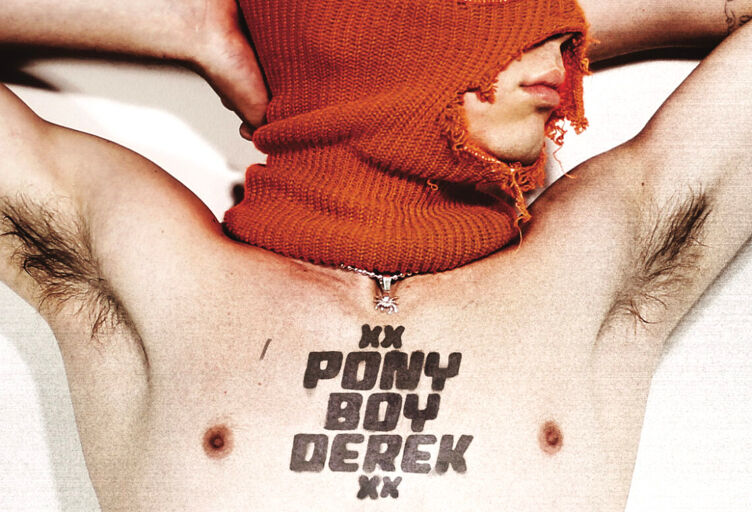
LGBTQ NATION: Yes, I wanted to talk about the interactive element. I believe I’ve read that because it is a play and you’ve already constructed the narrative and all the videos are pre-recorded, the content isn’t actually responding to the actual comments, reactions, etc. in real time, right?
GT: That is correct. The stuff that is reacting to that is just me tweeting or responding to a DM when somebody asks me something. People are actually feeding into some of these themes. A couple of days ago, I got a DM from someone telling me that I delete all of my content and start posting d–k and ass if I wanted to blow up on the platforms.
LGBTQ NATION: Do these people understand what the project is? That an actor is playing this role?
GT: It’s half and half. Some people are coming to this thinking that it’s a real person, and some people are coming to it knowing that it’s a filmed theatrical event. So it’s mostly the people who don’t know that are coming to me with those things. It’s just interesting that they’re actually feeding into the exact themes that I’m trying to point out. [The character] is an 18-year-old who is not ready to show all of himself yet. He’s getting DMs from people saying, “If you don’t post all of yourself, you’re not ever going to make it in this.”
LGBTQ NATION: And you’re responding to them in character, so you’re not telling them that PonyBoy is played by an actor and is not real.
GT: Correct. I’m kind of leading them on saying, “It’s coming soon, I promise! Make sure you subscribe!”
LGBTQ NATION: PonyBoy is masked throughout, and you’re not revealing the actor’s identity until the end. But can you tell me a little bit about casting the role? What were you looking for?
GT: It was a long process of casting the role, just because of what this project is. Most of the piece is just monologues. It’s mostly just him reciting monologues to a camera, and every time we did a take, because of the nature of what the play is, there’s no edits. We didn’t get the freedom that you get in traditional film where, Oh, they messed up that line, we can go and edit it.
LGBTQ NATION: Like a play onstage, you didn’t cut and reshoot.
GT: Absolutely. The monologuing was intentional. And even though there’s not a lot of nudity in the play, there is a lot of exposing of the self and vulnerability with your body and exposing your body. I also needed somebody who could act that, who could handle the monologues and not get so in their head that if they messed up a little they’d have to start over again. They would actually be able to keep going as if they were the character. Every single monologue we did was one take. I wanted someone who was comfortable in exploring themselves in the room with us, somebody who was brave enough to do that, because it’s asking a lot of someone to do that. So I wanted someone who could do that and I wanted someone who had an understanding of acting and crafting a character and could keep rolling with the punches. In the same way that I’m improving online, I needed someone who was gonna be able to improv with the script some if they needed to.
So the actor that we found is a rising TikTok star, aspiring actor. He’s just phenomenal. He handled everything so well. I cannot speak highly enough about him. I’m so excited for everybody to know who it is.
LGBTQ NATION: It seems to me, this could be a story told through any social media platform. Why did you choose OnlyFans?
GT: I started working on this in the middle of the pandemic with no real idea of when theater in person was coming back. I was seeing a lot of stuff with theater that was intended for in-person performance being translated online, but it was never meant to be online. It was always meant to be in person and we were just using Zoom for the time being. I wanted something that felt more website-specific. I wanted something that felt digitally native. And at the time, 2020, 2021 was when we really saw that rise in OnlyFans and digital sex work, because people were at home all the time. People were home and they were alone and they couldn’t go to their hook-ups like they normally would, if they were doing that. You get online, you watch porn, you watch OnlyFans. There was such a spike in it. And OnlyFans as a platform—you pay for it, you get one person—it already felt like that model was ripe for use and nobody had used it yet.
OnlyFans just felt so relevant, so of the moment. We’re living in such a pornified digital world, especially with young people. Another big inspiration for this was Bad Baby, who was on Dr. Phil. There was this kind of digital grooming happening to her where all these people were like, “When you turn 18 you have to make an OnlyFans.” So, she turned 18 and she made an OnlyFans, and she made, like, a million dollars in six hours. Because everyone just waited for her to turn 18. That was were the idea for the show starting when PonyBoy turns 18 came from, because of this idea of everybody—Technically, you’re legal, but there’s not much difference from the day before. You couldn’t post porn the day before and all of a sudden, 24 hours later, you can. And what does that do to you when you’re so young? And how does that affect you in the long-term when you’re making those decisions at such a young age. And I don’t have any answers. I’m just questioning it.
LGBTQ NATION: Were there specific tropes or hallmarks of OnlyFans content you wanted to explore or critique?
GT: The biggest thing I wanted to critique was that digital grooming, like I said. And this idea that if you don’t post all of yourself immediately— There’s so much worth put on the body, rather than the person in most cases. So, that was a big thing I wanted to critique. What happens when somebody who is not ready— If you watch [xXPonyBoyDerekXx] now, he’s starting to do a lot of, like, vlogs, which is not really what OnlyFans is known for: vlogs where you get to know someone. And he’s starting to get pushback. I just got a comment on the X account saying, “When are you gonna start posting real content. This is not real content.” So I guess I wanted to critique, you know, what happens when someone uses that platform, and wants to do it, wants to do it on their own terms and their own time, and they also want to show more of themselves than just the body. They have other aspects of them that they want to expose on the platform. And like I said with the white male body: how does that play into it? How does that affect who subscribes and who doesn’t subscribe.
LGBTQ NATION: My kind of limited sense of the site and others like it is that they have given adult performers a way to own, control, and monetize the content in which they appear…
GT: I see what you’re saying, and it’s a complicated question, because I think it really depends on the person you ask, how they feel about that kind of thing. Some people like having that agency over their work. And I also think that it varies depending on if you’re asking someone who identifies as a man, someone who identifies as a woman, someone who identifies as nonbinary. It varies depending on your identity. For women in the industry, I feel like it’s probably a little bit muddier in terms of how they would approach this.
There was a great essay posted recently by a pretty popular porn star named Ty Mitchell. He posted an essay kind of announcing his retirement from porn because of the rise of OnlyFans. I’m just paraphrasing here: He never wanted to be the producer, the editor, the casting person—he never wanted to do any of that. And because OnlyFans is so big now, and that is kind of the primary form of porn now and has led to an amateurish aesthetic in porn that he never had any interest in. He wanted to be a porn star. And he’s left porn now because that is what it’s become. But other people love the idea of being able to film, edit, produce, direct, cast their own things and choose who they are doing scenes with and choose when they do it and how they do it.
LGBTQ NATION: And it’s a financial thing too. The performer owns that content. My understanding is that when performers film for an adult film company, they get a one-time rate and that’s it. They don’t make residuals on their image that this company now owns and can do whatever they want with in perpetuity.
GT: Yeah. I think it really just depends on who you’re asking. That’s not the main part of this piece, but I think that’s always interesting to bring up in conversation with it.
LGBTQ NATION: Your play is very much about the performance of self, which is something I think we all do all the time. But online, on social media, that becomes a whole other thing, and can be particularly fraught.
GT: The thing that’s so interesting to me and the thing that I always kept in my mind as the piece was developing was that you don’t really get any cracks in the persona that PonyBoy’s created. A typical movie would have him filming a video and after he films the video you see him sit or mope or whatever. You get to see behind the camera. With this, you only see what he chooses to post. The video that you see, he could have gone through 10 takes before he decided that this was the one he wanted, where he didn’t reveal too much of himself. Everything that he posts is intentional, as with any content creator. You’re getting what he thinks is the perfect video of himself, so you’re not seeing these cracks that you would normally see in a typical play or film. All of it is his construction of who he is.
LGBTQ NATION: What are you aiming to show people about the way that content creators like PonyBoy perform their selfhood.
GT: I don’t think that I’m ever trying to critique in a negative way. I’m running the account daily, and the biggest thing I’ve learned is actually a huge, huge respect for people who do this. It is a full-time job. It is so hard to do, to just constantly be thinking about, you know, you have an audience now and they want a certain thing and you have to appeal to that while also protecting yourself. I can’t even imagine doing it with pictures of my own body, my own self.
I’m simply just trying to reflect back what I see, and it’s up to other people to come up with how they read certain things or how they interpret certain things. In my work, I’m just seeking to reflect it back and see if anything new is unlocked in people who watch it about themselves.
LGBTQ NATION: The character in xXPonyBoyDerekXx is 18, you’re 25. What is your sense of your generation’s relationship to that performance of self online and how it relates to selfhood and identity more broadly?
GT: That is a great question that I just don’t think any of us have a real answer to yet. It’s something that I’m thinking about a lot, and I think it will take years to figure out a separation or to see a separation between the two—what was influenced online, what is actually me. It’s such an odd space to be in.
It’s such a complicated thing to go through. That’s also why I write things about the internet and I’m trying to figure it out. All of my work is very digitally-minded or social media-minded. I’m trying to figure it out. Can you separate the two or are they forever intertwined? Like the internet will forever influence my reality and my reality will forever influence who I am on the internet? I do know that when this is all over, I will probably be deleting social media for at least a little while, just to get some separation.
LGBTQ NATION: Do you think queer people, and maybe gay men specifically, have a unique relationship to the performance or self online and the performance of sexuality online?
GT: Absolutely. A hundred percent. I feel like that goes back before social media as we know it now. That goes back to chat rooms and message boards. That’s actually a bridge that bring different generations of gay men, from Gen Z to millennials, together. I do think that’s something we all have a similar relationship to, how we seek out different things on the internet, and have been doing that for years now, when we are at this pivotal age of being a teenager and maybe being in a small town like this character was, and maybe not knowing anyone and trying to find your people. The internet’s right there. Why wouldn’t you use it? I think there’s definitely a specific relationship to the internet that gay men and also any queer person in general have. That’s where you go when you don’t have anyone else or you don’t know anyone. And I don’t think it’s gonna stop anytime soon.
LGBTQ NATION: We talk more about parasocial relationships with celebrities and influencers now. What do you see as unique about that sort of relationship between online sex workers and their fans?
GT: I think the difference is, in some of those parasocial relationships with celebrities and TikTokers— If you’re purchasing an OnlyFans [subscription], you’re buying into it, literally. And you know what you’re getting into. You know that somebody’s gonna be responding, you have this relationship with them, and the OnlyFans creators themselves also know that this is a parasocial relationship. I think the difference is that both parties know that they’re engaging with it. Celebrities aren’t asking for that.
With OnlyFans, both parties are kind of consenting to do it together. Which kind of actually makes the parasocial aspect of it not so… creepy. You’re subscribing to someone’s OnlyFans account because you want to see their body or want to see them having sex, and the OnlyFans person, that’s what they want. This is their job. But there’s a contradiction: what happens when you have these people who are buying into it, but they want you to do things and they think that they have an ownership over that? Because they’re paying for it, you have to do these things. It’s a big ol’ contradiction, and that’s all the internet is.


